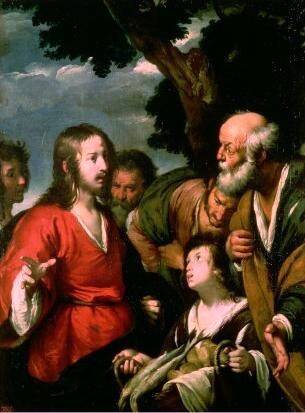Yesterday's reading marking the Solemnity of the Immaculate Conception was the same reading we hear on the Solemnity of the Annunciation. It's of the dramatic moment where the angel Gabriel comes to Mary to tell her that she will bear Jesus.
Of all the things we might say about this famous and challenging reading, I am always most struck by Mary's first response: "How can this be?"
In a word, "Huh?"
The fact that she lacked access to advanced science did not mean she was unaware of how babies were made. Her reason told her that something was off. No way, she must have thought. This cannot be happening. Pregnancy, according to the normal way of things, was impossible.
We know what happens next: Gabriel explains that Mary's pregnancy will result from the Holy Spirit, and she will be the mother of God.
According to nature, according to human biology, Mary was totally right. Her incomprehension signaled her humanity. Mary's confusion reminds us of a dynamic that emerged in the Old Testament and continues in the New: With God, human reason no longer sets the horizon for what is possible. The human intellect, gifted though it is, has the capacity to be overwhelmed, astonished, thrown back on its heels.
What Mary begins to understand at Jesus' conception, the apostles learn during Jesus' ministry. In the story of the feeding of the five thousand, for example, the apostles look at the teeming crowds and tell Jesus: "This is a lonely place, and the day is now over; send the crowds away to go into the villages and buy food for themselves." It is such a pragmatic, such a human response. They are probably tired and annoyed. Christ had been teaching all day, and the apostles probably wanted to be alone, perhaps relishing the exclusivity of being in Jesus' inner circle.
But Jesus replies, "They need not go away; you give them something to eat." But the apostles still resist: "We have only five loaves here and two fish."
In other words, How can this be? How can we possibly feed five thousand with only a few loaves? It must have struck them as bizarre. Jesus was asking them to perform the impossible. He was ordering them to do something that the laws of nature told them couldn't be done.
We know what happens next. In a moment of beautiful Eucharistic allusion, Matthew's Gospel tells us that Jesus broke the bread, blessed it, and gave it to his disciples to give to the crowd.
And they all ate and were satisfied. And they took up twelve baskets full of the broken pieces left over. (Mt 14:20)
"How can this be?" We return again to the question that Mary asked explicitly and which the apostles asked implicitly. And as we do so, we find that in Mary and the apostles we hear our own voice. Moments of confusion and unreasonable requests provoke a protective pragmatism that tries to shield us from disappointment or defeat.
When we think of our children's education, and we anticipate the tuition payments due, we might ask: How can this be?
When we consider an illness ravaging a friend or relative, or perhaps a disease of our own, we might ask: How can this be?
When we are called to forgive a friend or family member and must revisit the pain of the relationship, we might ask: How can this be?
When life asks us to sacrifice hard-earned savings, risking retirement or home, we might ask: How can this be?
When storms demolish neighborhoods and cities, leaving thousands dead or desperate, the whole world asks: How can this be?
The scenarios go on indefinitely. Sometimes human reasoning leads us to a cliff. We cannot go further. Fear or frustration, maybe both, sounds the siren of retreat. Our efficient minds offer a "no way," a "that's impossible," or a "go home and buy your own food." How many times have we felt just like Mary, just like the apostles? How many times have we surveyed our situation and felt the demand to feed five thousand with food that barely feeds five?
Christmas season, with its Marian focus, calls us to contemplate one of the great truths of our Catholic faith: grace builds on nature. We don't have to have the answers to our questions. We don't have to solve our bewilderment. We need to listen to Jesus. The apostles didn't have to become magicians; they had to believe that Jesus could multiply the food. Mary didn't have to do something miraculous in reproductive medicine; she had to trust that God could. Mary and the apostles had to take leave of their own rationale, their own ego, their own natural reactions. They had to walk over the cliff, trusting that the emptiness disguised solid ground.
Let us pray to do the same. Let us pray for the faith of Mary. Let us believe that in our work and in our home, in our lives and in those of friends and family, we can multiply loaves, feed the hungry and walk on water. Amen.








